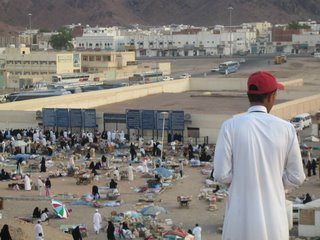As-salam Alaykum!
I don't have very much time to post but insha'Allah I have 3 posts that I've compiled in the past couple of days. This one is just comprised of random highlights from a class with Imam Zaid, and some of my own reflections... Please remember my notes are just that--mine, so there may be errors... and of course, Allahu Alim.
Throughout the Qur’an, Allah swears by the Arabic letter nun and assures the prophet sallalahu `alayhi wa salam that he’s not insane. The power of the pen (qalam) is of something that writes. (The pen truly is mightier than the sword). This is the first thing that Allah created and He ordered it to write that which would sustain until the Day of Judgment. After Allah swears on the letter, He swears on all that would happen on the day of judgment. The station of the message and the Divine Law are at the highest state so how could people accuse this great wisdom as insanity?
“And surely you, O Messenger of Allah, for your patience…” in speech and action, he practiced patience and forebearance with his enemies, and for this there is a guaranteed reward that isn’t limited.
Aisha (ra) was asked about the prophet’s (saw) character and he was known to have the most beautiful character and he became angry at that which was against the Qur’an and endorsed the Qur`an. He never was rude with anyone and didn’t reciprocate vileness.
Today, what is our character when people all around the world are attacking (verbally and physically) and killing Muslims?
Aisha (ra) said that whenever one of the companions or a person from the prophet’s (saw) house called him, he would always answer that he was at their service! The leader of the people is their servant who is ALWAYS accessible to the people and responds to their needs. The prophet (saw) was the greatest example of a person with outer physical beauty and inner beauty. If we ever see any type of physical beauty, we should pray that Allah makes their inner character as beautiful as the outside. Character gives a light and this can take away any outer unpleasantness.
The prophet’s (saw) character was exalted because he had no other concern but with Allah! If we were concerned with Allah alone, we wouldn’t have any envy, jealousy, etc… The greatest motivation to lie is fear of punishment. If we only feared Allah, we wouldn’t fear anything from the creation.
The prophet (saw) combined all the noble characteristics that all the prophets (peace be upon them all) before him brought. He (saw) perfected them. All the prophets (pbut) declared tawheed.
A Jewish Rabbi who lived in Yemen narrated a lot of righteous descriptions of the prophet’s (saw) character:
“If he were to walk past a candle, it would blow out because of his coolness/calmness… he would open hearts that are closed… serenity his garden, righteousness his banner… truth will be his law… guidance will be his leader… Ahmad is his name.”
Our approach to life has been united by the prophet (saw) “I will unite nations that have been split up.”
“Save great groups of people from damnation”- if it weren’t for Islam, where would be? It teaches us to not have any drama with friends, family, etc…
Islam started off as something strange and will return to something strange.
Tyranny in the family will bring tyranny in society. Sociological theory of congruence—what happens in one social institution (at home) can be repeated in broader society. Patterns are recyclical: those oppressed will oppress others. Patterns of behavior are top down and bottom up.
By seeing a cheerful character, your own spirits will rise up and this is how people are affected. Through seeing this, the companions wanted to be like this. The prophet (saw) always smiled. However, even in jokes, he would only speak the truth and it was purposeful. This cheered people up and showed they can have a good time. Excess laughter/joking hardens the heart and people may begin to have an enmity towards the person. Today, with joking and sarcasm, children start being rude to adults. We need to have a balance of being friendly with children and being authoritative. Extremes of any kind distort relationships.
It is not lawful for a Muslim to startle another Muslim. No more scaring each other that means!
If a man is light and jokes with his family, this is highly liked from the Divine Law because homes should be a balance that is conducive to seriousness of life along with light fun.
Imam Ahmad relayed that Aisha (ra) said that once a women came to the prophet (saw) and asked him if she could rebuke her husband because he hit her. The prophet (saw) asked what was going on. The husband said she abused him. The wife replied that she didn’t abuse him, he was praying and he had broke wind, so she had told him that the prophet said to make wudu after breaking wudu. After hearing this, the husband got up and hit her. The prophet (saw) laughed and said to not rebuke the wife for something good she told.
All relationships start off in jannah (SUBHANALLAH!!) and those who knew each other in paradise are friends on earth!
Hold fast to the rope of Allah and remember His blessing by putting love between you and your enemies.
Lessons of humility from the prophet (saw):
-Aisha (ra) relates that the Prophet (saw) used to sew his own garments, repair his own sandals, and do housework.
-Prophet (saw) would respond to invitations of a slave.
-His blanket was coarse.
-He chose the life of a servant over a king
-He would ride behind the children and he didn’t find this disrespectful.
-He said “Do you know the right Allah has over His servants? They worship Him and don’t associate partners. Do you know the rights of the servants? He doesn’t torment them in the hellfire.”
-A troubled woman came to the prophet (saw) to talk and said “I need you.” He (saw) sat with her on the sidewalk in Madina until she was at peace!
-On pilgrimage, the prophet (saw) asked for water. The people said this water is public and people have scooped their hands in it, so they offered to get him water from the house, but the prophet said “I have no need for that water, I want to drink the water of the people.” The peoples’ hands would be blessed in the water that he has that was his reason for drinking from the same water.
-The prophet (saw) would ask his companions to pray for him when they went for hajj!
SubhanAllah… when hearing these accounts our hearts should be soft and yearn to be with the beloved!
Reflections from Thursday, August 3
Shaykh Abdullah bin Bayyah gave an introduction/welcoming session yesterday. SubhanAllah how his presence in the room just made my heart feel at rest! The shuyukh are so genuine and sincere. This has all been such a humbling experience for me thus far. More than anything they teach, seeing their character is what truly affects us (the students). We know without a doubt that these shuyukh are really implementing the sunnah of our beloved Rasul sallalahu `alayhi wa salam. It makes me realize that we really do need to hasten to gain sacred knowledge. Just to think that these shuyukh can die off any day makes me think where we would all be without them? Who would take their place, as we know no one can! Who would carry this struggle on and who will be the defenders of Islam?!
“Leaders” now are no longer “servant leaders” as the prophet sallalahu `alayhi wa salaam was, but these shuyukh are those who live humbly, wash their own dishes, and clean their own houses.
We say we want to live and die for Islam, but what are we doing with our lives? Alhamdulillah many of us were blessed to go to UCLA and have a great MSA, but it’s nothing compared to the training we would go through with these shuyukh. We need to do a better job learning our deen, implementing this knowledge, and spreading it. It’s great to have a good social group, but we need to take more advantage of it for Islam—for ourselves to get closer to Allah.
I think I’ve gained a better understanding (inshaAllah) of loving for the sake of Allah. I’ve really rethought so many things about myself and what I want. I think western notions and ideals have convoluted many perceptions and things I want. Alhamdulillah I feel more focused… inshaAllah I can only pray that Allah forgives me and grants me patience, tawfiq, and a greater understanding of Him.
Imam Zaid discussed the relationship between students and teachers. He told us about how much adab we should have. One of the organizers relayed a story of how he went to visit Shaykh Mar Abdul Hajj and how he’s very old and weak. The organizer held his hand and asked the shaykh to pray for him. The shaykh was so weak that he could barely squeeze his hand nor can he really be heard when reciting du`a, but when this brother said he was the servant of Shaykh Hamza, the shaykh grasped his hand and began reciting dua really loudly! Even people outside came in to see what was going on. SubhanAllah! When the organizer conveyed this story to Shaykh Hamza, he broke down and cried profusely. SubhanAllah how much respect and love they have for each other! May we all have such a relationship with someone!


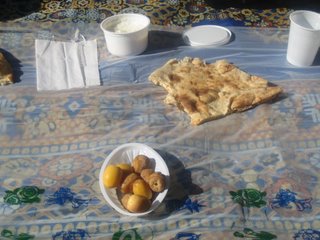
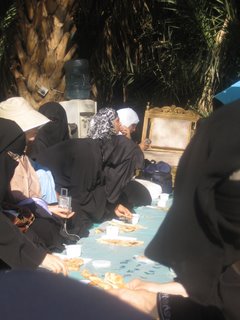
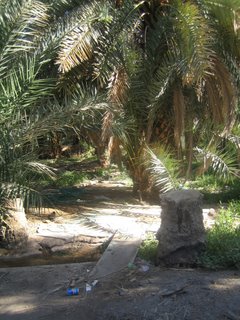









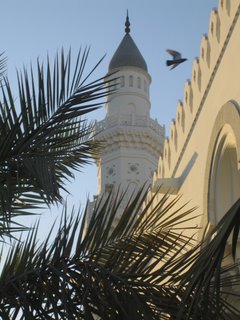





 Cuteness! =) MashaAllah
Cuteness! =) MashaAllah







